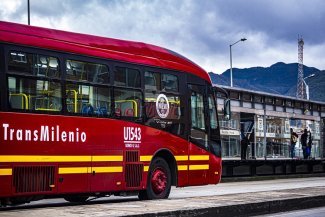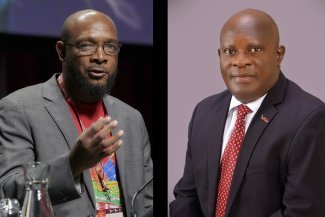Une mère syrienne et son fils font la file dans un centre de distribution d’aide de l’HCR, dans la plaine de la Bekaa, au Liban.
The veil of silence in the Hamadi’s new tent conceals an insurmountable tragedy. At the beginning of December, an accidental fire took the lives of five children from this family from Homs that have been living in an informal settlement in Bekaa Valley in eastern Lebanon since 2013. A moment’s inattention with a portable stove and their previous dwelling went up in flames. The fire spread within minutes, setting around 30 tents ablaze, almost the entire camp. “We fled the fighting to save our children and now they are dead. We no longer expect anything from life,” laments the mother of one of the five children.
It is not the first fatal fire to break out in the refugee settlements spread across Lebanon : the tents, made from wood and covered with canvas and plastic, as well as being like ovens in summer and fridges in winter, burn easily. The safety conditions in the camps are abysmal and they are not even equipped with the most basic services such as running water, latrines or drains.
Owing to its proximity with Syria, Bekaa Valley is the region with the highest concentration of refugees : currently around 357,000.
According to government figures, there are approximately one and a half million Syrian refugees in Lebanon.
Since the Lebanese government asked the United Nations to stop registering new arrivals in 2015, with the unachieved aim of stopping the flow, only two-thirds of these refugees are ‘official’.
In December 2017, the UN High Commissioner for Refugees (UNHCR) announced that, for the first time since 2014, the number of Syrians registered in the country had fallen to under a million. The spokesperson for the UN agency, Lisa Abou Khaled, told Equal Times that a few thousand people had returned to Syria in the last year.
After seven years of war – with a death toll of around 350,000 people – the technical defeat of the Islamic State and the widespread victories of the Bashar al-Assad regime, the prospect seems to be emerging of Syria entering a post-conflict era, but the reason for the refugees’ return is not so much the incipient stability back home as the increasingly untenable conditions in the host country. Not to forget : this year, for the first time since 2009, Lebanon will hold parliamentary elections on 6 May.
Alarming fall in aid
According to observers, humanitarian organisations and the refugees themselves, 2017 was the worst year since the start of the crisis. Last April, the UN made an almost desperate plea to donors, given the lack of aid funding for the refugees in the region. An international commitment worth US$6 billion was secured at the conference on Syria held in Brussels that month (around €4.8 billion), but in October, the UNHCR and the World Food Programme (WFP) were forced to suspend assistance to 220,000 refugees due to the lack of funding.
Both agencies claim that the funds were simply redirected to people in even greater need. WFP spokesperson Edward Johnson explained that the support goes to the poorest of the poor and the priorities were reset based on the vulnerability of the beneficiaries.
There is growing doubt on the ground, however, about the new redistribution. “At least 250 people with different disabilities and special needs have had their money withdrawn,” says Fatima Alhaji, a Syrian journalist who has been living in Bar Elias in Bekaa since 2013 and regularly visits the camps. Humanitarian staff working in other camps in the country also report that assistance has been withdrawn from families in dire need, with no resources and with four or five children.
Over 70 per cent of the Syrian refugees in Lebanon live below the poverty line, 60 per cent in extreme poverty and 87 per cent are in debt, according to UN figures.
In 2017, despite the gravity of the situation, UNHCR only received 58 per cent of the US$464.5 million requested for its programme in the country, which is the furthest it has ever been from its funding target.
Analysis of the 3RP requirements (Regional Refugee and Resilience Plan, which includes the UNHCR, other UN agencies, international NGOs and the governments of Turkey, Jordan, Lebanon, Iraq and Egypt) shows that Lebanon only received 52 per cent of the 2.2 billion required for its humanitarian response.
Humanitarian organisations are also increasingly feeling the impact of the fall in funding. According to an internal document, seen by Equal Times, of the LHIF (Lebanon Humanitarian INGO Forum, an informal platform grouping over 40 international NGOs), many of its members have expressed deep concern over the fall in donations, which will mean cuts to essential services all across Lebanon in 2018. Several participating organisations, the document points out, are already having to close down offices due to the lack of funding.
Patience run dry
With over a million and a half Syrian refugees, on top of the half a million Palestinians, Lebanon, a small country of 4.4 million inhabitants, long since ran out of patience and resources, already short before the war broke out in the neighbouring country. The Lebanese government estimates that the Syrian conflict has cost its economy US$18 billion.
The climate is tense and the locals are showing ever-growing hostility towards the refugees. A survey conducted by UNHCR reveals that over 80 per cent of Lebanese citizens think that the Syrian presence has contributed to increasing the level of violence and crime in the country ; over 90 per cent feel it is putting pressure on resources such as water or electricity ; and almost 75 per cent considered the idea of marriage with a Syrian national to be disagreeable or very disagreeable.
The number of evictions has risen in recent months, especially in Christian areas.
The murder of Rayya Chidiac, the daughter of a wealthy family in the city of Miziara in northern Lebanon, at the hands of a Syrian refugee in October 2017, led to the overnight eviction of hundreds of Syrians from the area. Little did it matter whether they had been living there for years or even decades.
Also following Chidiac’s murder, the authorities in the northern town of Bsharri imposed a 18.00 curfew on Syrians, prohibited them from gathering in public places and from renting accommodation in the area. In various parts of the country, Syrian refugees have come under pressure and have been evicted by the police or local authorities for working outside of the one of the three legally authorised sectors : agriculture, construction and cleaning.
Official statements against the Syrian presence are not new, but Lebanese politicians have become more vociferous in recent months, taking advantage of international forums to make their position clear. “If the United States accepted 120 million Mexican refugees, its economy would collapse in two days,” Economy Minister Raed Khoury said, to illustrate his point, in a meeting with the World Bank in October. Meanwhile, President Michel Aoun has repeated over and over again that Lebanon is no longer able to cope with the vast numbers of Syrian refugees and that a plan is urgently needed to send them back to “safe zones”.
Humanitarian organisations and agencies, starting with the UNHCR, have expressed alarm at the proposal, warning that Syria lacks the necessary conditions for a safe return and making it clear that they do not intend to play an active role in any forced repatriations.
Alhaji explains that she is in touch with people who have gone back. “They only did so because the situation was unbearable in Arsal, in the north-east of Lebanon, on the border with Syria, the area where the largest numbers of refugees are concentrated. The men feel they are in danger, especially after what happened in summer, but aside from that, there is no work there, no education... no life.”
With the Lebanese authorities and people showing them the door, many refugees, tired of the atrocious living conditions, the discrimination, the lack of assistance and the inability to obtain work or residence permits, are wondering whether there is a least-worst solution.
They know what awaits them on the other side of the border : a home destroyed by bombs, army conscription, jail or death. For now, there is no promise of a future in Syria, but the present in Lebanon is ever more bleak.










